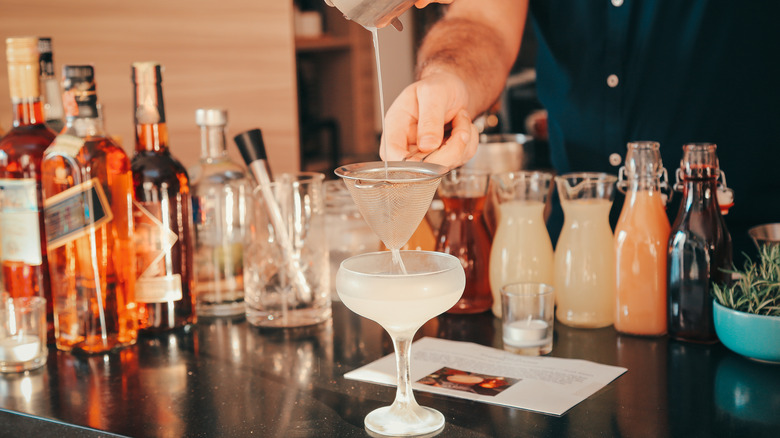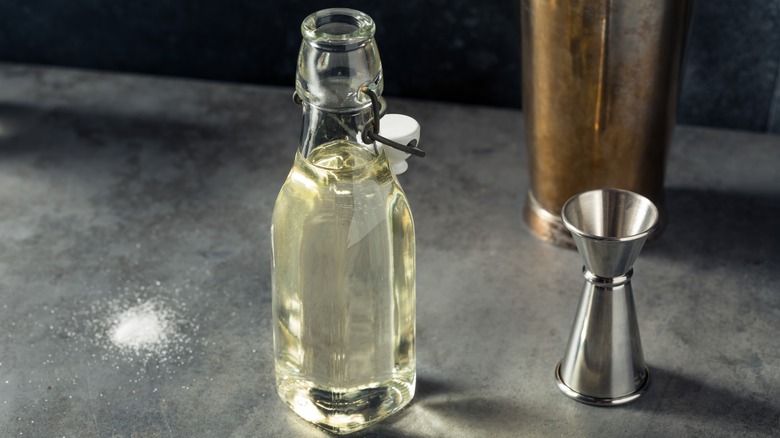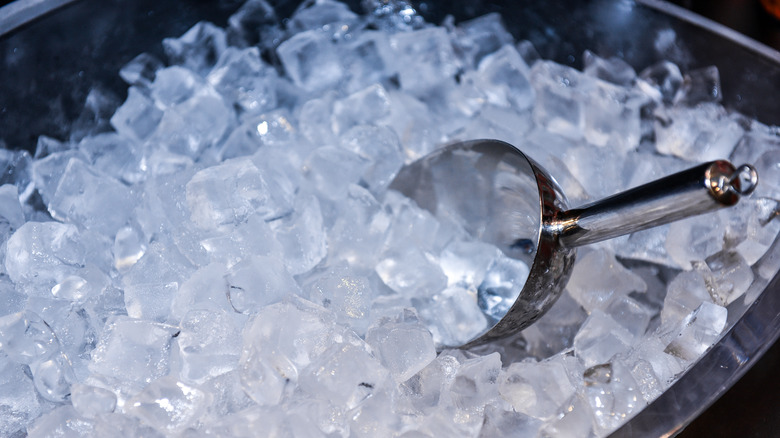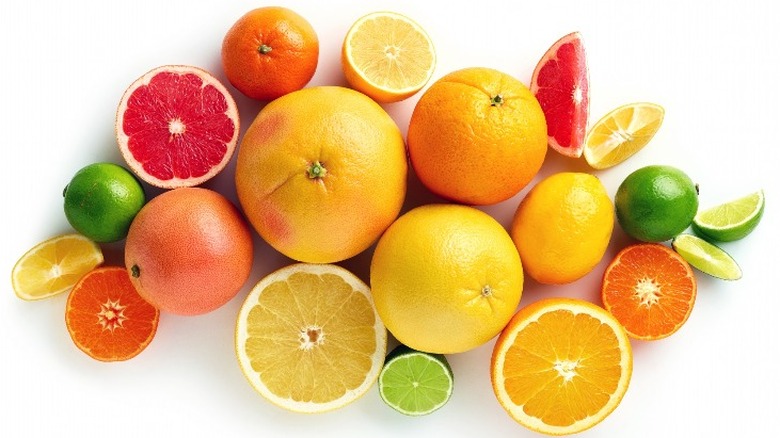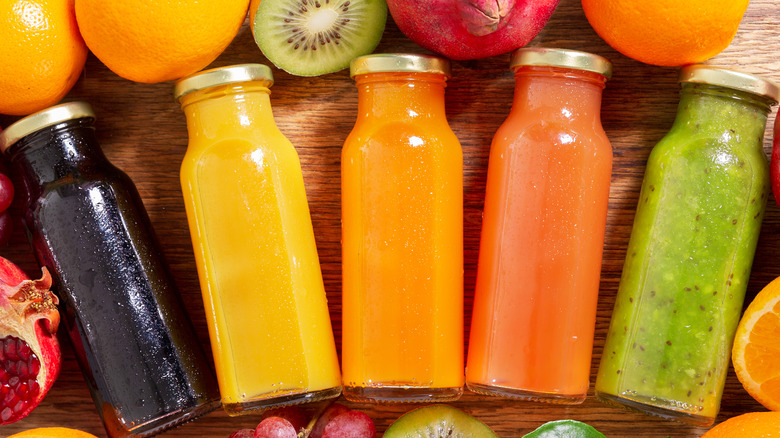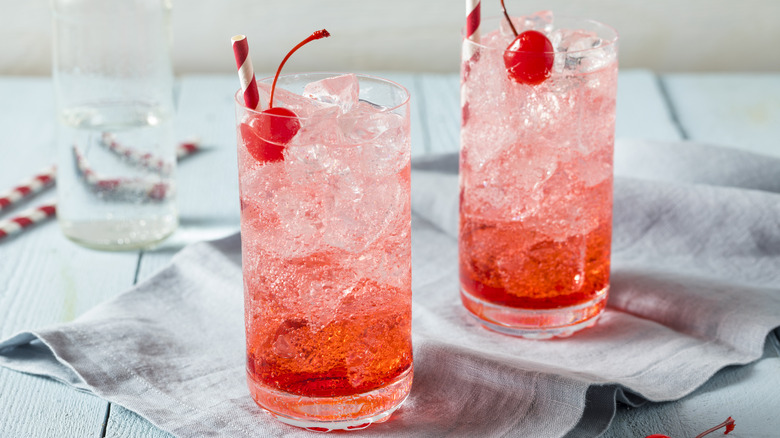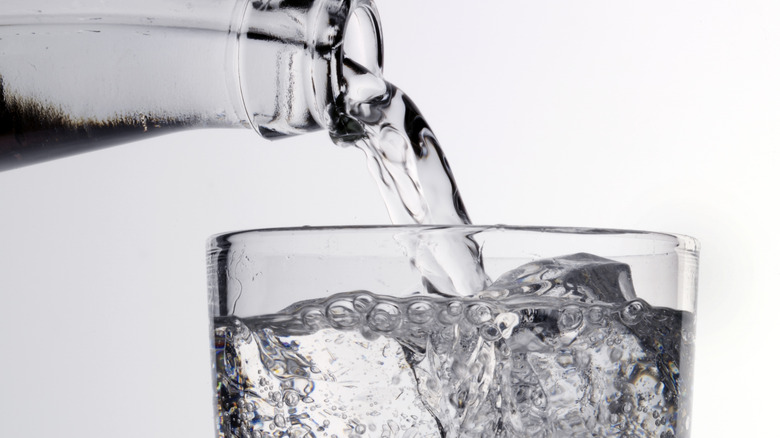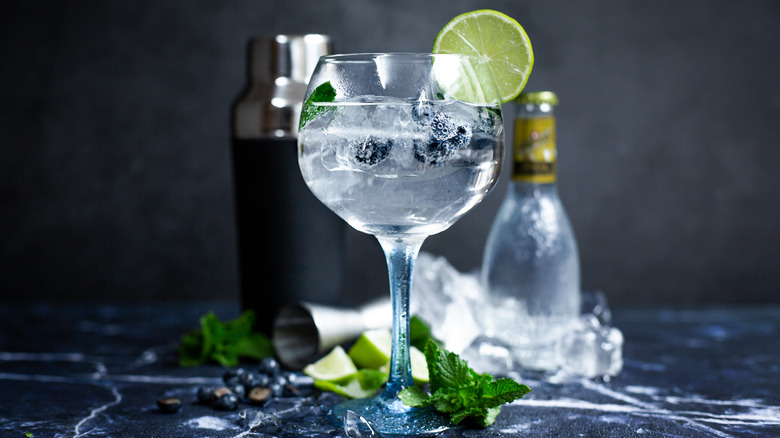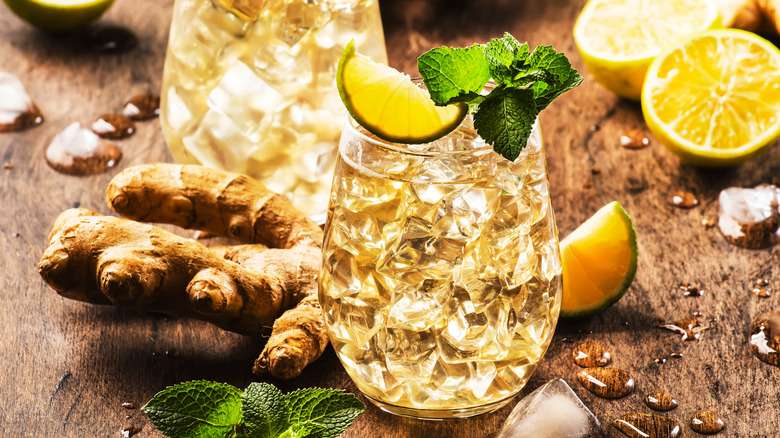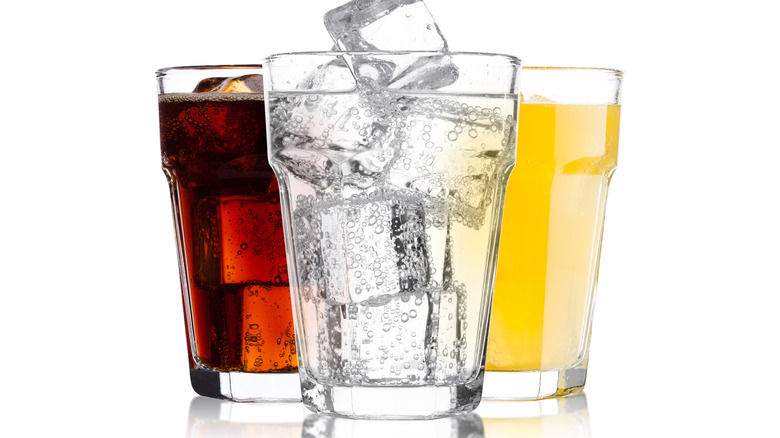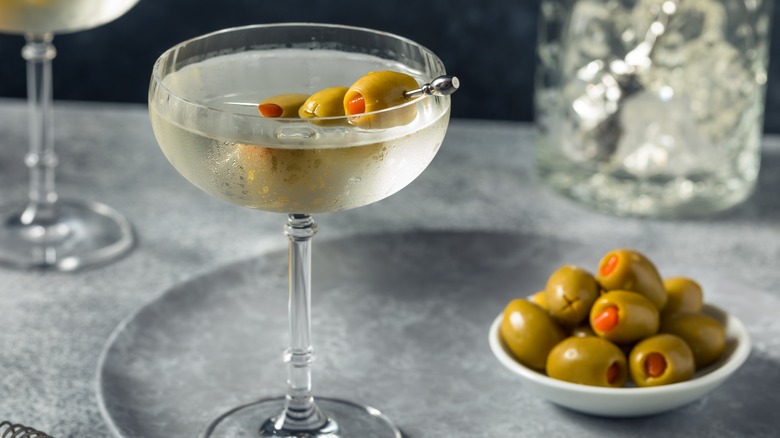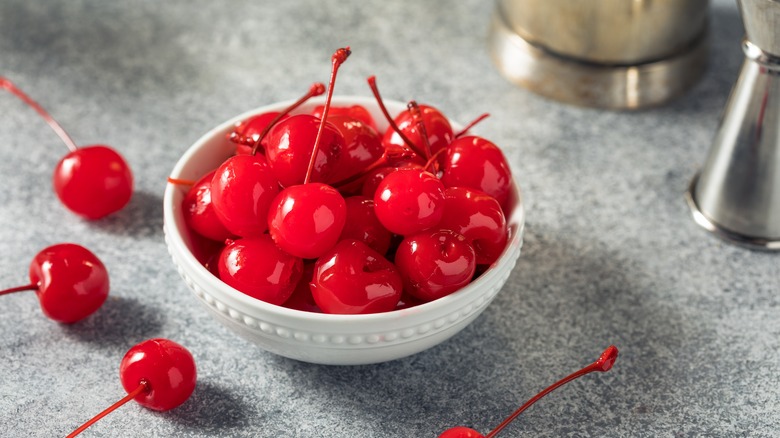11 Non-Alcoholic Ingredients Every Home Bar Needs
Going to the bar for a fancy cocktail is always fun, but it takes much less effort and cash to put on some sweat pants and pour yourself a drink at home. Sure, you can take the easy route by pouring a glass of wine or cracking open a canned beer or mixed drink. However, true spirits enthusiasts know that nothing beats a craft cocktail you make yourself once you master the art. It just takes a decently stocked home bar.
Sure, there are the staple bottles of booze like vodka, rum, and whiskey to keep stocked at your bar at all times. Then, there are those other boozy ingredients, like liqueurs or vermouth, that should also hold a permanent place on the shelf. However, we all know that unless you're into drinking liquor straight up, you'll need a few more ingredients to make even the most basic of cocktails.
While picking out your favorite booze is easy, it's the non-alcoholic stuff that can trip you up. We've decided to make your shopping list for you by recommending 11 non-alcoholic ingredients every well-stocked home bar needs. It's a great roundup if you're hosting a party, as some of the perishable stuff is better to buy on an as-needed basis. If you're looking to elevate your bartending skills at home, this is the ultimate place to start.
Simple syrup
Simple syrup, as you might expect by the name, is one of the most basic ingredients to keep at your bar. It's endlessly useful in drinks, both boozy and not, as well as desserts and other sweet recipes. Simple syrup is basically just equal parts water and sugar, cooked down until the sugar is dissolved. It's easy to make as long as you know the proper technique. The one rule to keep in mind is that to ensure that the syrup isn't cooked at too high of a heat so that it boils, some of the water evaporates, and the ratio is thrown off balance. There are techniques to make it both hot and cold, and you can mix up the recipes with different sugars and flavors to make it your own. It's also worth noting that Mashed's simple syrup recipe does suggest you don't store this stuff on the bar, as it'll last longer in the refrigerator in an airtight container.
Boiling down simple syrup may not be possible in a pinch. But thankfully, many brands, like Collins, make ready-made simple syrup, taking all the work out of it for you.
Ice
Ice is usually an afterthought ingredient in general. We tend to think of it as the necessity to make our drinks cold and no more, but it has a major impact on every cocktail, even if you use the most high quality ingredients otherwise. And not all ice is created equal. To prove this, Vine Pair did a deep dive on the best ice for every cocktail. In general, the standard cubes are fine for most drinks. Big ice cubes make a big difference in liquor-forward drinks or spirits on the rocks, as it takes longer for the cube to melt therefore giving you more time to sip on the drink before it gets too watered down. And crushed ice cubes are recommended for tiki drinks or anything that includes a lot of sweet and syrupy ingredients, as it turns any cocktail into a defacto snow cone.
Even if you opt for the plain ice cube from a classic tray, it's also important that you use fresh ice. If you use ice that's been sitting for days in the freezer, there's a chance it will have absorbed the flavors of other foods in the freezer, which will result in a less-than-stellar flavor in your cocktail.
Citrus fruits
Have you ever been making a drink that tastes off, but totally comes together when you squeeze a little lemon or lime juice into it? That common occurrence is the epitome of why citrus fruit is a staple for any bar. Fresh orange juice and grapefruit juice is a bonus, but the bottled stuff does just fine for recipes that require those flavors. The real key is to have some fresh lemons and limes on hand at all time.
Any skilled bartender knows that lemons and limes have different roles in the cocktail sphere, so both are required in any well-stocked home bar. Typically, brown spirits tend to be paired with lemon while clear spirits fare better with limes. As explained by Bar and Restaurant, lemon juice is mostly citric acid while lime juice is a combination of citric and malic acid. The difference between the two is subtle, but important. Citric acid gives you more of that instant sour punch, while the malic acid leaves the tartness lingering in your mouth longer. There's plenty more science behind it, but the bottom line is that a bowl of lemons and limes, and a good citrus juicer is really all you need to balance out virtually any cocktail you dream up.
Juice mixers
In some cocktail cases it's best to have fresh fruits and juices whenever possible to enhance a drink. It's a lot easier to go the fresh-squeezed route with citrus fruits, but sometimes you need a short-cut. That's why it's important to have ready-made fruit and vegetable juice on hand to add to any cocktail.
Like most ingredients, the juices to keep stocked is totally up to personal preference. But there are a few staple juice mixers that are good to always have on hand. Tomato juice is key for Bloody Marys or a quick Michelada. Cranberry is a must for vodka drinks, plus it's an easy ingredient to make big-batch cocktails go a long way. Pineapple juice is essential for tiki-inspired and tropical drinks, and often comes in cans with a long shelf life. The possibilities for juice are endless, so it's good to always have a few favorites within reach. It's not that you need the juice to act as a sole mixer. Rather, it adds acidity, sweetness, and flavor to your drinks, even if you add just a splash to your cocktail shaker as an afterthought.
Grenadine
Grenadine is the mysterious ingredient that you will find at any decently stocked bar. The sweet and bright red syrup is what makes a Shirley Temple drink so fun, and it's what is responsible for adding color and flavor to cocktails like rum runners and tequila sunrises. The average drinker might think grenadine is the product of cherries, but it's actually made from pomegranate juice that is reduced down with sugar to form a syrup.
Grenadine gets its name from the French word grenade and the Spanish word grenada, both of which translate to pomegranate. It's another must-have sweetener to keep on hand for when you need it, and odds are if you're experimenting with cocktails, you will want to add a splash every now and then. Masterclass explains the process for making a simple grenadine at home, but it is more labor intensive than some people might like. Thankfully, mainstream brands like Rose's sell ready-made grenadine that you can order on Amazon to make it one less ingredient that you really have to worry about adding to your shopping list.
Club soda
Club soda is a must for any bar. Even if you can't mix up a margarita or a martini, anyone can make a simple concoction with liquor and club soda. But it can be a tad confusing to head into the seltzer aisle and figure out the right bottle to buy. To make it simple, club soda and seltzer water, for all intents and purposes, are the same thing. Like still water, the flavor of plain club soda can vary from brand to brand, but the purpose of it is to dilute your drink and add bubbles.
Club soda and seltzer water are both infused with carbon dioxide to make them fizzy. Club soda typically has added minerals resulting in a slightly salty taste, while seltzer usually doesn't have those added minerals. The nutritional impact of both are minimal — club soda and seltzer both have no sugar, calories, fat, protein, or carbs (via Healthline). Both also come in flavored options that can add a lot to your drink, but the basic stuff is the canvas you need to build an endless amount of cocktails. To get some really good, bar-quality bottles of club soda, Fever Tree has a line of both plain club soda and sparkling flavors like Sicilian lemonade and pink grapefruit that make the perfect two-ingredient cocktails. Additionally, Q Mixers is another name to know in the mixer world that makes a premium, high-quality club soda that pairs well with vodka, tequila, rum, and beyond.
Tonic water
While they both look the same, tonic water is a separate ingredient all of its own that you should have stocked on your bar in tandem with club soda. Tonic is still considered carbonated water with added minerals, but it also contains a plant-based compound called quinine. The ingredient is noticeably bitter, and is said to be able to help treat malaria (via Advanced Mixology). Only small amounts of quinine are included in tonic water so that the bitter taste isn't too powerful, but it adds another layer to the flavor. Most tonic waters also include sugar or some other sort of sweetener to balance out the slight bitterness, which also means tonic water does have carbs and calories, unlike club soda. The options for tonic waters are endless, but Fever Tree also has a few bar-ready varieties including plain, lemon, cucumber, elderflower, and Mediterranean, which is a good place to start.
Ginger beer
There are a few different types of soda that you should keep stocked at your bar, and ginger beer is an important one that you don't want to go without. Ginger beer is distinctly different from ginger ale, which is typically made with soda water and ginger syrup (often not even made from real ginger) for flavoring. On the other hand, ginger beer, as you might expect from the name, is made through a similar process to beer, as it requires yeast to be made. However, the average ginger beer doesn't contain any alcohol.
Ginger beer is made with sugar, ginger, water, and ginger beer plant, which a starter culture made up of yeast and bacteria that, along with the fermentation process, gives ginger beer its slight funk (via Masterclass). Ginger beer is a must for Moscow mules and other drinks that require some bubbly zest, and it typically comes in cans that are easy to store under your bar for whenever your cocktail calls for it.
Flavored soda
Aside from juice, soda is probably the most common alcohol mixer. It's so ubiquitous in fact, that the soda names are often included in some of the most popular cocktails, like a rum and Coke or a vodka and Sprite. It's good to have a few go-to flavored-sodas on hand at your bar when the desire for a simple mixed drink strikes, or if you need a flavorful chaser for a shot of straight booze. The basics are cola, ginger ale, and a lemon-lime soda. Those three essentials all compliment different liquors that you will have in your newly well-stocked bar, and it's easy to store a few cans to reach for in a pinch. Everything else, from root beer to orange soda, is up to personal preference. And if the traditional sugary sodas aren't your thing, brands like Olipop make low-sugar alternatives with flavors that channel classics like Dr. Pepper and cherry cola and are perfect mixers for cocktails.
Olives
Garnishes are the cherry on top of your drink (sometimes literally), so it's only right they're the cherry on top of this list. Sure, orange twists and mint leaves are important for drinks like old fashioneds and mojitos, respectively. However, you can typically buy the perishable items on an as-needed basis. One garnish that's good to always keep in stock is a jar of good green olives. Olives are necessary to add a briny bite to a dirty martini, and they make great garnishes for other savory cocktails like Bloody Marys.
And garnishes don't just add pretty visual appeal to a drink. In the case of olives, the salty flavor and vinegary smell add layers to the experience of drinking the cocktail they reside in (via Moody Mixologist). And the olive brine itself is often also used as a cocktail ingredient in some recipes. Olives may seem like an easy ingredient to skip in most cocktails, but you'll be glad you stocked your bar with a jar when you need a perfect gin martini at a moment's notice.
Cherries
Finally, the actual cherry on top of the list is a good jar of cocktail cherries. They're the ideal garnish for almost any drink, from the most basic mixed beverage to complicated tropical cocktails. The bright red maraschinos you see on top of ice cream sundaes will work fine for Dirty Shirley Temples, whiskey sours, and beyond if that's what you decide to keep on-hand at your bar. However, as with any ingredient, you can get really fancy with your cocktail cherries.
Luxardo cherries are basically the pinnacle of cocktail garnishes and are loved for the distinct flavor and elegance they add to any drink. The Italian cherries are plump, deep red, tart, and come with a thick syrup that's an ideal sweetener for cocktails. Additionally, many brands make cherries soaked in booze themselves – like bourbon, brandy, and rum — that add even more of a boozy kick to the drink they're accompanying.
